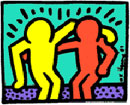Not-So-Best Friends

Ever since Laurel was an infant, she’s been very particular about the company she keeps, and this trait has persisted to peers (even, I swear, during the phase where it was all just supposed to be parallel play). The socialization issues continue to change as we go along, so I’m particularly grateful for Tracy’s commentary and resource lead on how to cope with difficult friends:
“As Gabriel has grown more independent and trustworthy we have allowed him to make more choices on his own. One of those has been about how to spend his time outdoors. He can play in the backyard, or ride his bike on the sidewalk near our home. This has brought with it a new neighborhood friend, just a year older. This friend has brought with him behaviors and interactions that have us gnashing our teeth.
In the last few weeks, I’ve noticed a change in Gabriel’s behavior when he plays with this child. He has been more argumentative with us, has harshly excluded his little brother, and has sometimes been just plain mean. Alarm bells began going off for me when he initiated a conversation admitting that he had told lies to this friend in order to keep the friend interested in playing with him.
I’ve watched their interactions closely, and have noticed some bothersome patterns. I’ve overheard out-and-out lies from the friend designed to make Gabriel feel inferior. If Gabriel calls him on it, he leaves, saying he doesn’t like how Gabriel is treating him, or that he doesn’t like being accused of lies. I’ve watched as a bewildered Gabriel tries to get him to come back and play. The friend is interested in riding bikes and playing sports, the same activities that can keep Gabriel busy for hours, so I understand his dilemma.
This child has also tried, on occasion, to lie to my husband and me. If we’ve intervened in a situation that was hurtful or not safe, he usually will take no responsibility for his role. With a kid like Gabriel, who at 6 already has a well-developed sense of fairness and social justice, this is hard for us to watch. You can see the struggle on his face…he wants this friend to stay and continue making skid marks down the sidewalk…but he wants to feel like he’s in his own comfort zone with respect to his moral compass.
All of my protective instincts kick in and my first desire is often to ban this friend from our network. But, I’m also drawn to the teachable moments. I can tell from this kid’s style of interacting with us and our children that he is used to getting his way or smoothing things over by manipulation. It’s as if he thinks a problem will go away if he finds the right thing to say. I’m starting to suspect that this is a pattern he has learned at home, but I can’t do much about that.
So, what can I do? It has been difficult for me to know exactly when I should step in and when I should let them work this out on their own. I have now started intervening when my discomfort is signaling that the kids aren’t having fun, or aren’t able to figure it out on their own. Mostly, this includes when I know a lie is being told, or when one is getting their feelings hurt (it has gone both ways). I try to include both boys in the discussion, and set firm limits on what is acceptable behavior at our house. I have decided for myself that if this child wants to play with my kids on our side of the street, he’ll do so by my rules.
My husband and I also talk to Gabriel frequently about his interactions with this friend. We usually start by asking if he had fun, and point out when we’ve noticed things didn’t seem like that. I’ve tried to explain to him what happens inside us when friends make us feel like we’re not as good as they are, and how tempting it can be to do the same right back. It’s challenging for him, but I think he gets it.
The best article I could find on line (and I looked for hours), was this one. It confirmed for me that trusting my instincts about the effect this friend had on my child was the best bet. Intervening was also encouraged. Parents should feel okay about stepping in to set limits with other kids, especially on their turf. If you can do so in an assertive way, so much the better. Your child gets to see what a mature reaction looks like when you say something like, “At our house, name calling is not allowed. If you’d like to stay and play, you’ll have to follow this rule,” sets the limits firmly, and allows the other child a chance to improve their behavior.
This brief article hit the highlights, including information on why independently chosen friends are so good for kids this age, and warning signs to look out for if your child is having more trouble than average making and/or keeping friends.
As we strive for balance in letting Gabriel figure this out for himself, and stepping in to protect the values we are raising our children with, I hope that we’re doing it well. I hope we’re giving Gabriel the tools he will need to decide what types of people he wants to spend time with, to assert his rights, and be comfortable in his decisions in difficult situations.”
Image credit: “Best Buddies” (1990) by Keith Haring
